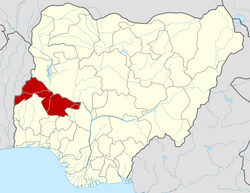Local Government Areas of Kwara
| Kwara | |
|---|---|
| State | |
| Nickname(s): State of Harmony | |
 Location of the State of Kwara in Nigeria |
|
| Coordinates: 8°30′N 5°00′E / 8.500°N 5.000°ECoordinates: 8°30′N 5°00′E / 8.500°N 5.000°E | |
| Country |
|
| Geopolitical Zone | North Central |
| Date created | 27 May 1967 |
| Capital | Ilorin |
| Number of LGAs | 16 |
| Government | |
| • Governor (List) |
Abdulfatah Ahmed (APC) |
| • Deputy Governor | Peter Sara Kisira |
| • Senators |
|
| • Legislature | Kwara State House of Assembly |
| Area | |
| • Total | 36,825 km2 (14,218 sq mi) |
| Area rank | 9th of 36 |
| Population (2006 census) | |
| • Total | 2,371,089 |
| • Rank | 30th of 36 |
| • Density | 64/km2 (170/sq mi) |
| GDP | |
| • Year | 2007 |
| • Total | $3.84 billion |
| • Per capita | $1,620 |
| Time zone | WAT (UTC+01) |
| ISO 3166 code | NG-KW |
| Website | kwarastate.gov.ng |
Kwara (Yoruba: Ìpínlẹ̀ Kwárà) is a state in Western Nigeria. Its capital is Ilorin. Kwara is located within the North Central geopolitical zone, commonly referred to as the Middle Belt. The primary ethnic group is Yoruba, with significant Nupe, Bariba, and Fulani minorities.
Kwara State was created on 27 May 1967, when the Federal Military Government of General Yakubu Gowon broke the four regions that then constituted the Federation of Nigeria into 12 states. At its creation, the state was made up of the former Ilorin and Kabba provinces of the then Northern Region and was initially named the West Central State but later changed to "Kwara", a local name for the River Niger.
Kwara State has since 1976 reduced considerably in size as a result of further state creation exercises in Nigeria. On 13 February 1976, the Idah/Dekina part of the state was carved out and merged with a part of the then Benue/Plateau State to form Benue State.
On 27 August 1991, five local government areas, namely Oyi, Yagba, Okene, Okehi and Kogi were also excised to form part of the new Kogi State, while a sixth, Borgu Local Government Area, was merged with Niger State.
As of 2006, the population of Kwarans was 2.37 million based on the Nigeria 2006 Census. This population size constitutes about 1.69% of the Nation's total population having relied upon immigration for population growth and socioeconomic development.
...
Wikipedia
